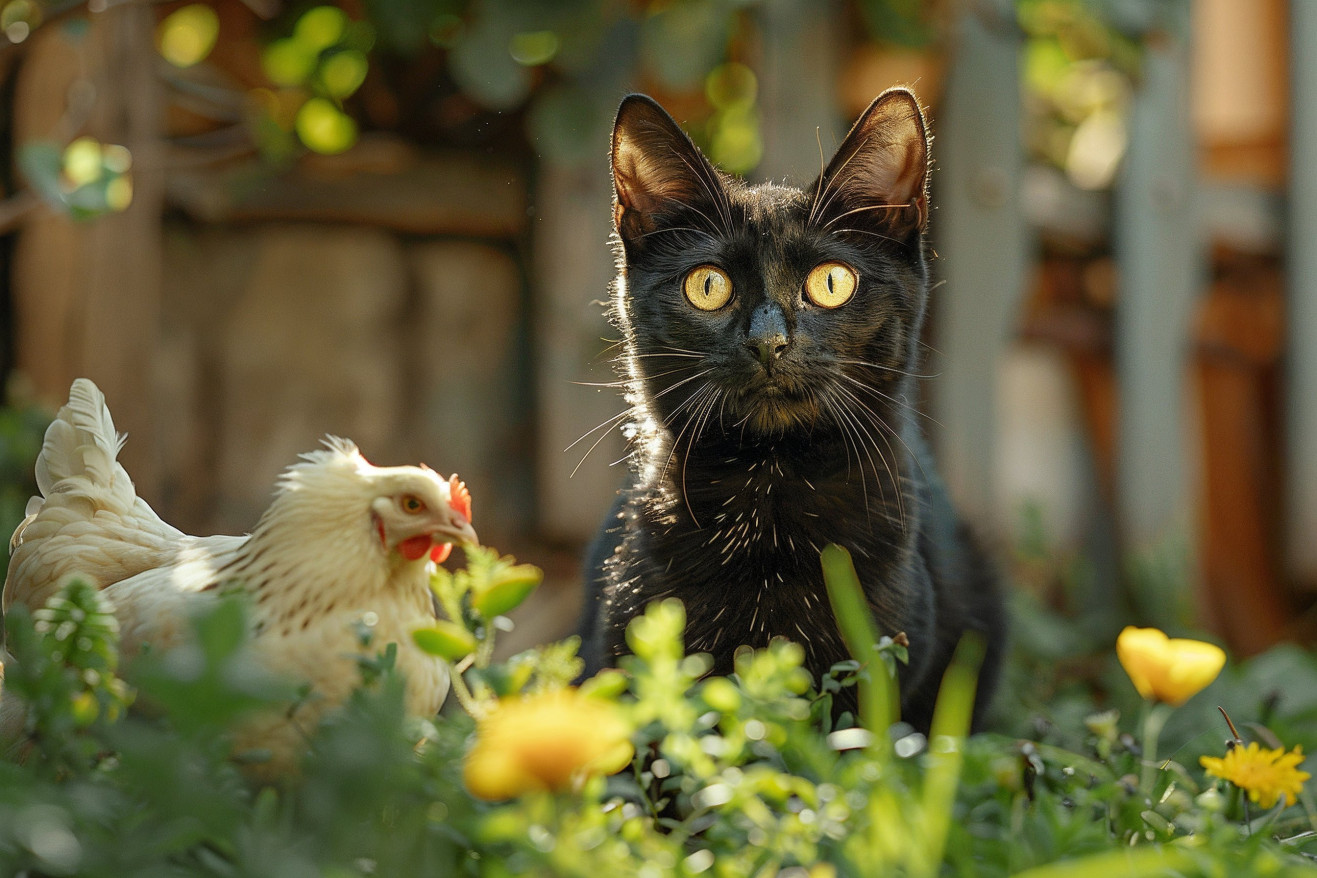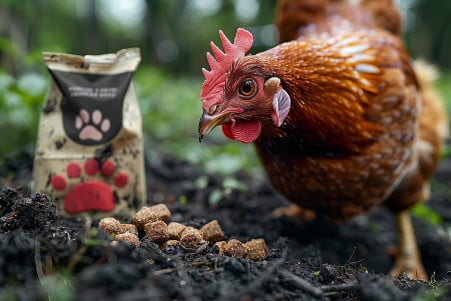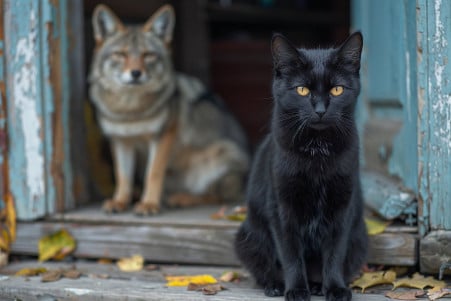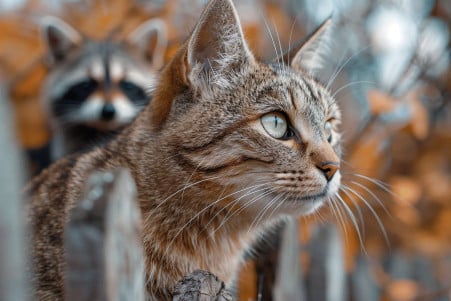Do Cats Eat Chickens? How to Keep Your Flock Safe
20 April 2024 • Updated 19 April 2024

If you have chickens, you may be wondering if you need to protect them from cats. The short answer is yes, but the level of protection your chickens need depends on the type of cat and the age of your chickens. Cats are natural hunters, and while well-fed domestic cats are unlikely to attack adult chickens, they will hunt chicks and young chickens.
On the other hand, outdoor cats, especially feral cats, are a significant threat to adult chickens. In this article, we'll explore the risks cats pose to your backyard chicken flock and discuss the best ways to protect your chickens from cats. We'll also talk about the differences between domestic and feral cats and explain why it's important to keep your chickens safe from cats.
Do cats eat chickens?
Why Do Cats Hunt Chickens? The Science Behind the Threat
Cats are obligate carnivores, and their hunting instincts are a product of millions of years of evolution. As a result, they have highly developed senses and physical attributes that enable them to be highly effective hunters, even in a domestic setting. Cats are agile, and their retractable claws, sharp teeth, and powerful jaws enable them to quickly and efficiently kill their prey. According to PoultrydDVM.com, "Cats are agile predators with retractable claws, sharp teeth, long whiskers, and have keen hearing and vision (especially at night)."
These attributes, combined with cats' natural inclination to be most active at night, when many chickens are roosting, make it easy for them to stalk and attack chickens. While well-fed cats may not kill adult chickens, Catster.com warns that "Baby chicks can make tasty little snacks...and their predatory instincts will kick in." Even bantams and other small breeds are at risk, as cats may see them as prey to be hunted for food or sport.
Recognizing these natural hunting behaviors is important when assessing the threat cats pose to chickens, especially young, small, or otherwise vulnerable birds. Preventative measures need to take into account cats' hunting skills and their ability to gain access to areas where chickens are kept. However, as long as the proper precautions are taken, the risk of the kind of attacks that The Tender Gardener experienced can be reduced.
House Cats vs. Feral Cats: The Danger to Chickens
When it comes to chickens, domesticated house cats are generally less dangerous than feral or stray cats. According to The Everyday Mom Life, well-fed house cats are more likely to be curious about chickens or see them as potential toys than prey. As a result, they are less likely to hunt and kill chickens for food.
On the other hand, feral and stray cats are a much bigger threat to chickens. As the Agriculture In Zambia article notes, these cats are not used to human contact and don't have a guaranteed food source. As a result, they are more likely to hunt and kill chickens for food.
This means that owners need to be especially concerned about feral cats, which, according to BackYard Chickens are the biggest threat to chickens. It's important to make sure that you have strong protections in place to keep your chickens safe from these experienced hunters.
Gradual Introduction: Encouraging Peaceful Coexistence
With time and a gradual introduction, cats and chickens can eventually live together in harmony. According to Omlet US, "A bit of careful preparation" will help other pets like cats adjust to having chickens around. A slow introduction will help the cat get used to the chickens' scent and behavior.
This can be done by letting the cat watch the chickens from afar and then slowly moving to controlled face-to-face interactions. MyPetChicken.com suggests "Make sure the cats and chickens can see each other from day one" to help this process along. During interactions, make sure you have toys and treats on hand to help redirect your cat's hunting instincts.
It's important to make sure that you're always supervising until your cat is no longer showing any signs of aggression toward the chickens, according to Katzenworld. However, with time and a slow introduction, cats and chickens can eventually live together in harmony, allowing your chickens to roam your yard without a care in the world.
Fortifying the Chicken Run: The Best Deterrents and Barriers
A secure chicken run with proper fencing is the best way to protect chickens from cats. As Hepper notes, "Even a small gap under your fence could be big enough for a cat to squeeze through." To keep out digging predators, Omlet UK suggests burying fencing at least a few inches below the ground and angling the bottom away from the run. Mesh or wire netting can be used to cover the top of the run to keep cats from getting in from above.
In addition to fencing, motion-activated lights, sprinklers, and fake predator statues can help scare off cats that are trying to get into the run, according to Hobby Farms. For smaller coops, a run that is completely enclosed with a wire mesh roof is the best option, according to Omlet UK. It's important to make sure that there are no gaps that cats can use to get into the run, as this is the best way to keep them out and keep your chickens safe.
Guardian Animals: Roosters, Dogs, and More
Roosters can be powerful guardians, using their size and strength to chase off cats. As BackYard Chickens says, "Roosters can confront and protect chickens from cats." Roosters are very territorial and will both sound the alarm and physically protect their flock from predators.
Dogs, especially larger breeds, can also be trained to protect the coop and deter predators like cats. Grit explains that dogs "can scare away cats and protect the chicken flock." With the right training and socialization, dogs can be a great form of protection.
Other livestock such as geese, guineas, or even small livestock guardian animals may also be used to help alert owners to predators. According to Agriculture In Zambia, these animals "can help alert owners to threats." However, it's important to make sure that these animals are introduced properly to avoid any aggression toward the chicken flock.
The most effective way to protect backyard chicken flocks from predators is to use a combination of guardian animals and secure coops. By using both of these methods, you can greatly reduce the risk of a cat attack on your flock.
Conclusion: Keeping Your Flock Safe With Constant Awareness
The danger that cats pose to chickens can vary, but feral cats are the most likely to attack. Knowing what drives a cat's predatory instincts and what can make them more likely to hunt is important.
Proper housing, deterrents, and guardians can all help keep chickens safe from cats. In some cases, a slow introduction may even make it possible for cats and chickens to live together. However, constant awareness and a combination of protective measures are the best way to keep backyard flocks safe.


